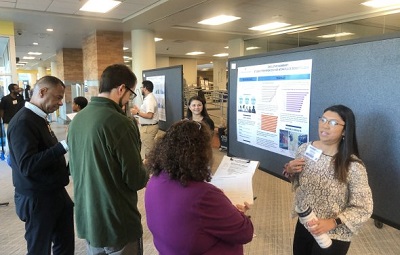Genomic Insights into Colorectal Cancer Recurrence: A Differential Network Analysis Approach
Description/Abstract/Artist Statement
Recent advancements in next-generation sequencing have led to new opportunities in analyzing gene expression data. Several research studies have shown that insights into gene regulatory networks through the analysis of gene association data can help better understand a disease process or a biological function. Comparing gene networks from different groups of populations has become a popular approach leading to new discoveries in gene function. In this project, we considered publicly available gene expression data for two groups of colorectal cancer (CRC) patients categorized by their disease-free survival (DFS) event. We investigated the differences in gene regulatory networks among the two groups of CRC patients by integrating gene regulatory pathways into the analysis. By comparing gene expression networks between these groups, we aimed to clarify molecular signatures associated with CRC recurrence and explore whether specific gene pathways are linked to disease progression. The findings from this study contribute to the understanding of CRC progression and may facilitate the development of prognostic biomarkers and targeted therapies for improved patient outcomes.
Faculty Advisor/Mentor
Dr.Sinjini Sikdar,
Faculty Advisor/Mentor Department
Mathematics and Statistics
College Affiliation
College of Sciences
Presentation Type
Poster
Disciplines
Applied Statistics | Biostatistics | Investigative Techniques | Vital and Health Statistics
Session Title
Poster Session
Location
Learning Commons Lobby @ Perry Library
Start Date
3-30-2024 8:30 AM
End Date
3-30-2024 10:00 AM
Genomic Insights into Colorectal Cancer Recurrence: A Differential Network Analysis Approach
Learning Commons Lobby @ Perry Library
Recent advancements in next-generation sequencing have led to new opportunities in analyzing gene expression data. Several research studies have shown that insights into gene regulatory networks through the analysis of gene association data can help better understand a disease process or a biological function. Comparing gene networks from different groups of populations has become a popular approach leading to new discoveries in gene function. In this project, we considered publicly available gene expression data for two groups of colorectal cancer (CRC) patients categorized by their disease-free survival (DFS) event. We investigated the differences in gene regulatory networks among the two groups of CRC patients by integrating gene regulatory pathways into the analysis. By comparing gene expression networks between these groups, we aimed to clarify molecular signatures associated with CRC recurrence and explore whether specific gene pathways are linked to disease progression. The findings from this study contribute to the understanding of CRC progression and may facilitate the development of prognostic biomarkers and targeted therapies for improved patient outcomes.


